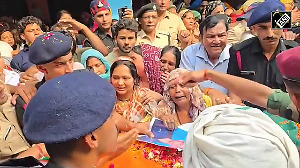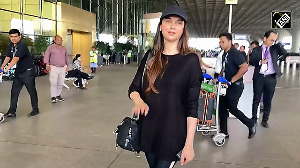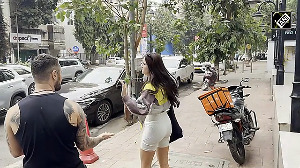The high-octane campaign for the first phase of the crucial Gujarat elections, viewed as a prestige battle for Prime Minister Narendra Modi and a litmus test for the leadership of soon-to-be Congress president Rahul Gandhi, will come to an end on Thursday.
Here’s everything you need to know about the polls -- from candidates to the constituencies.

A total of 89 seats -- out of a total 182 -- spanning the Saurashtra and South Gujarat regions, are up for grabs in the first phase with 977 candidates in the fray, including Chief Minister Vijay Rupani. Voting will be held on 9 December.
While the Bharatiya Janata Party is fighting anti-incumbency and struggling to alter a seemingly negative perception about demonetisation and the goods and services tax rollout, the Congress -- galvanised by an assertive Rahul Gandhi -- has mainly targeted the “hollow Gujarat development model” to slam Modi.
Modi and Gandhi had aggressively led their parties’ campaigns in Saurashtra and south Gujarat which often turned personal. Saurashtra and Kutch are crucial for the ruling BJP as these two regions have the highest concentration of seats in the first phase.

In 2012, the BJP won Gujarat for the fifth consecutive term. The BJP’s vote share was 47.9 per cent against Congress’s 38.9, the difference being 9 per cent. Compared to 2007, the difference is down by 0.49 per cent. In 2007, the BJP’s vote share was 49.12 per cent against 39.63 per cent of the Congress, the gap being 9.49 per cent.
The erosion in the vote shares of both the parties was attributed to the four-month-old Gujarat Parivatan Party led by Keshubhai Patel, which had cornered 3.6 per cent of votes.
The highest difference in the vote shares of the BJP and the Congress was 10.4 per cent in 2002, when polls were held in the aftermath of post-Godhra riots. The BJP’s vote share then stood at 49.85 per cent, its highest ever during its 17-year rule in Gujarat.

Not in many years has an assembly election in Gujarat promised a contest as close as it does this year. In 2017, the Congress, out of power for 22 long years, may well have its best shot at supplanting the BJP from power.
The BJP has consistently secured 40-49 per cent of the vote in Gujarat since 1995, the year it first came to power. A combination of caste calculations, Hindutva, and Narendra Modi’s charisma has kept it in power for the past 19 years.
The Congress’ vote share, too, has been consistent: it clocked a high of 39.28 per cent in 2002, in the elections that were held about ten months after the communal riots. In 2012, it secured 38.93 per cent. Its base has held steady, and this year’s poll is perhaps the party’s best chance at breaking the BJP’s hold over Gujarat.

Between 2011-12 and 2015-16, the BJP received more than four times as much from donors in Gujarat than the other five national parties put together.
The BJP received Rs 80.45 crore in 2,186 donations above the Rs 20,000 threshold, while the Congress, the Communist Party of India-Marxist, the CPI, the Bahujan Samaj Party and the Nationalist Congress Party received a combined Rs 17.10 crore in donations from the state during the same period, according to a five-year report released by Gujarat Election Watch and the Association for Democratic Reforms.

One hundred and thirty-seven candidates, accounting for around 15 per cent, are facing criminal cases, including serious charges such as murder, kidnapping and rape.
A party-wise analysis found that 10 out of 89 BJP candidates were facing serious criminal charges, while the Congress gave tickets to as many as 20 such candidates for the first phase of the polls.
Mahesh Vasava, son of former Janata Dal-United MLA, Chhotu Vasava, has topped the chart with 24 cases against him, including two of murder and one of attempt to murder, the report said, adding that he was also facing charges related to dacoity, robbery, rioting, assault, theft and kidnapping.
Meanwhile, of the total of 997 candidates contesting the first phase of Gujarat assembly polls, 198 nominees, belonging to different political parties as well as independents, are ‘crorepatis'.
The Bharatiya Janata Party has given tickets to 76 ‘crorepati’ candidates, the opposition Congress has fielded 60 such nominees. They are followed by seven from the Nationalist Congress Party, six from the Aam Aadmi Party and two from the Bahujan Samaj Party.

Photograph: Anindito Mukherjee/Reuters






